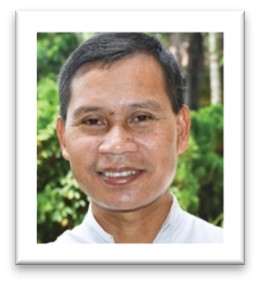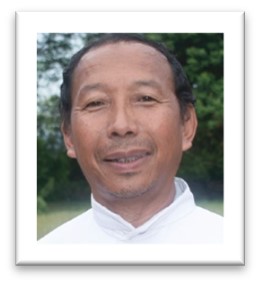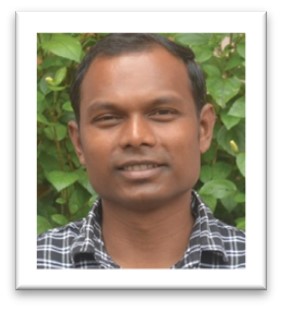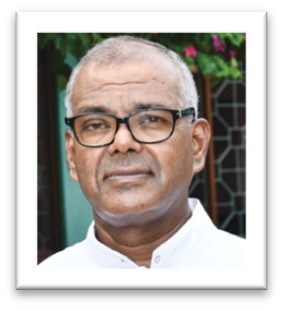The first Garo Catholics in Garo Hills were those baptized by the Holy Cross Fathers in the present Bangladesh and then migrated to Garo Hills, especially to those villages near Baghmara. The first apostle of Garo Hills was Peter Shem Momin, a Garo who received the Catholic Faith while undergoing agricultural training in Shillong. He was responsible for the early conversions at Laskarpara, Chotcholja, Damit Apal, Kharkutta and Dilma.
The first Salesian Missionary to tour Garo Hills was Fr. Gil in 1923. Frs. Piasecki and Marmol who visited Garo Hills and also those villages on the Baghmara side via Mymensing once a year followed him. In 1931 Msgr. L. Mathias, the then Prefect Apostolic of Assam appointed Frs. Pianazzi and Rocca to work among the Garos. As they were not allowed by the Government to reside in Garo Hills, they took up residence at Dhubri in 1932. In 1933, the Fathers managed to obtain from the then DC, Mr. William Shaw, permission to stay in Garo Hills and thus opened the first Catholic mission at Tura. From then on many European priests of the Salesians of Don Bosco have worked tirelessly to spread the Gospel in Garo Hills. The Sisters of the Congregation of Missionaries of Christ Jesus (MCJ) were the first women religious to arrive in Garo Hills in the year 1948. The first batch included Mother Camino, Sr. Maria de Villar and Sr. Pilar Gonsalves.
The missionary endeavors in Garo Hills received a great boost with the arrival of missionaries from South India. The first Indian missionaries to set foot in Garo Hills were Frs. M.P. Alexander and Mathew Elanjipuram who came to Garo Hills in 1956. Fr. E.O. Mathew in 1959 and Frs. George Mamalassery and George Elavumkunnel in 1960 followed them. In the year 1970, the MSMHC Sisters, the Missionary Congregation of Blessed Sacrament Fathers and some Diocesan priests from Changanacherry Diocese volunteered to work in Garo Hills.
Rt. Rev. Orestes Marengo SDB, former Bishop of Dibrugarh and Tezpur, was appointed Episcopal Vicar in 1972. On 7th April 1973, Tura was made a diocese by detaching territories from the Archdiocese of Shillong-Guwahati with Bishop Marengo as Apostolic Administrator. The diocese had at that time around 40000 Garo Catholics spread over the entire Garo Hills and the Goalpara and Kamrup districts of Assam. There were 6 parishes and a total of 21 priests: 16 religious and 5 diocesan. The sisters were only 26 in number.
The making of the new diocese accelerated the growth of Church in Garo Hills at all levels. New parishes were opened at Selsella (1973), Tikrikilla (1974), Chokpot (1974), Dadenggiri (1976), Mendal (1977), Williamnagar (1977), Garobadha and Tura, Chandmari (1978). The Medical Mission Sisters (1971), the MSFS Fathers and the Daughters of St. Thomas (1975) now joined the missionaries already working in Garo Hills. Numerous young men from the South India who later became priests were recruited now for the new diocese. In 1977 the first Garo priest Fr. Crispinus Rangsa from Baghmara was ordained a priest.
The Holy Father Pope John Paul II relieved Bishop Marengo of the office of Apostolic Administrator on 8 February 1979 and appointed Rev. George Mamalassery of the diocesan clergy as the first bishop of Tura. The new bishop was consecrated on 18 March 1979. The first task of the new bishop was to build proper infra-structure in all the existing parishes. Putting all his abilities into work, he completed in each of these parishes a church, a presbytery, hostels for both boys and girls, a convent, a school and a dispensary. In order to promote local vocations to the priesthood, a threestorey seminary building was built in 1983. Many new religious congregations were invited to work in the diocese. They were: Sisters of Mary Immaculate (1980), Daughters of Mary Help of Christians (1982), Franciscan Brothers (1983), Claretian Fathers (1984), Missionaries of Charity (1985), RNDM (1985), Sisters of the Cross of Chavanod (1986), SMMI (1987), Holy Cross Sisters, Menzingen (1993), Montfort Brothers (1995), Daughters of St. Francis De Sales (1996), Sacred Heart Sisters (1998), Capuchin Fathers (1999), Jesuits (2003), Disciples of Divine Master (2005) Ursuline Sisters (2006) and CFMSS (2007).
Bishop George opened many more new parishes and built many spacious churches at key centers. The new parishes opened were: Mangsang and Nangwalbibra (1979), Purakhasia (1981), Chimaimpel (1984), Rongkon (1986), Rongara, Ampati and Cathedral (1989), Songsak (1992), Araimile (1994), Mendipathar (1995), Rabhagre, Rajabala and Jengjal (1996), Siju (1997), Samanda (2000), Mronggre and Dumnikura (2003), Kharkutta, Chidimit and Chapahati (2004) and Dawagre and Danakgre (2005). In each of these parishes a church, a presbytery, hostels for both boys and girls, a convent, a school and a dispensary were built.
In 1987 Bishop George invited the Salesians of Don Bosco to open the much needed Catholic College at Tura to the great benefit of many Catholic boys and girls. In 1989 a parish for Rabhas and Boros by the name of Mukti Dada Ashram was opened in Tikrikilla under the care of Rev. Fr. E.V. George. In 1991, a pastoral centre was opened adjacent to the Bishop’s House. The establishment of the 150 bed Holy Cross hospital at New Tura in 1993 was a major event in the history of the diocese. On 29 March 1994, an interdenominational Garo Bible was released.
In 1995 when the new diocese of Guwahati was established, Damra parish, having a large number of Garo and Rabha Catholics, was given over to the new diocese. The opening of the Home for the disabled and normal School at Danakgre in 1996 was a significant event in the history of the diocese. In the same year a Marriage Tribunal with qualified personnel was established in the diocese. On 30 July 1998, barely a month before his 94 birthday, Bishop Marengo was called by God for his eternal reward. The Silver Jubilee of the Episcopal Ordination of Bishop George Mamalassery was celebrated on14th March 2004 at Tura. To mark the occasion, the Rino Simonetti Nursing School at Danakgre was blessed in the presence of all the Bishops of the region. In the same year, on 17th June 2004, His Holiness Pope John Paul II, nominated Rev. Andrew R. Marak as the co-adjutor bishop of Tura. He was ordained a bishop by Most Rev. Pedro Lopéz Quitanta, Apostolic Nuncio to India on 3rd October 2004 at Tura.
In the following year, on 31st May 2005, Fr. Mathew Elanjipuram, the first Indian and diocesan priest to work in Garo Hills, passed away. The SMI convent and the girls’ hostel at Rajabala were opened in 2006. In the same year spacious Churches were also built and blessed at Chapahati, Karkhutta and Damas. The Social Services of the diocese were re-organized and brought under the banner of Bakdil with a full-time director. On completion of 75 years of age on April 22, 2007, Pope Benedict XVI accepted the resignation of Bishop George, and appointed Bishop Andrew R. Marak as the Bishop of Tura.
Subsequent years saw further progress of the diocese. New parishes were opened in Rimrangpara (2007), Walbakgre (2009), Damas (2011) and Darenchigre (2012). In 2010, the Diocese lost two Diocesan Priests in the death of Frs Dominic Sangma and Tengman Momin. Providence Sisters came to work in the same year, followed by Augustinian Sisters in 2011 and Sisters of St. Francis of Assisi (OSF) in 2013. On 27 April, 2014 Rev. Fr. E.V. George, a pioneering missionary in Garo Hills and the apostle of Rabhas, passed away in Guwahati. In the same year, the diocese was blessed with three new parishes at Somonpara, Bajengdoba and Babadam. Existing schools at various parishes were extended and upgraded into High Schools and Higher Secondary schools.
BOSCO MOUNT
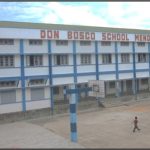
Bosco Mount, Rongkhon, situated about six kilometres from Tura, is the Aspirantate house of the Salesian Province of Guwahati. It started functioning with the first batches of post-matric, Class XI and Class XII students in 1986. Since then Bosco Mount has been the nursery of Salesian vocations for the Province. Savio Juniorate, Shillong, started in 1962, served as the Aspirantate of Guwahati Province for several years. It catered to the formation of candidates to Salesian life from Class VII to pre-novitiate. For several decades the aspirants after completing Class XII at Savio Juniorate proceeded to the novitiate.
It was felt that Savio Juniorate had more boys than it could accommodate. The need to give more attention to the high school students was keenly felt. In 1981, classes VII and VIII were shifted to St Joseph’s Umran. However, when Misereor, which had funded Umran as an agricultural school, objected to using it as an aspirantate, the Province had to take the aspirants back to Juniorate. Total number of boys from Class VII to pre-novitiate at Savio Juniorate used to be about 200. It was felt that Juniorate was overcrowded and the candidates needed different levels of attention in formation. Also the new guidelines of formation insisted on the separation of the pre- novitiate house from the aspirantate.In searching for a place, the decision to start the pre-novitiate house in Garo Hills was welcomed by the confreres especially those working in the region. When the provincial council decided to start the house in Garo Hills, Fr Mathai Kochuparampil, the then Provincial, requested the Bishop of Tura for a plot of land. There was some sort of hesitancy from the diocese to part with a plot of land beyond Tura on the way to Garobadha. Eventually Fr Antony Buccieri was asked to purchase a plot and the present site was bought.
The foundation stone for the building was blessed on 16 August 1984 by Bishop Orestes Marengo. The canonical approval for the house was obtained in 1985. The building was blessed on 17 October 1986. But the first batch of 7 boys entered the unfinished building on 24 January 1986, along with Fr Francis Fernandez (Dean of Studies) to prepare for the others who came on 6 February 1986. Altogether there were 74 boys and the first rector was Fr Joseph Kizhakkechennadu (1986- 1989). Others who served as Rectors in the following years are Fr Roland Kharkrang (1989-1993), Fr Thomas Chengniyaden (1993-97), Fr John Mathew Mundaplackal (1997- 2000), Fr Jose Vettath (2000-04), Fr Milon Narjary (2004- 2007), Fr Januarius S Sangma (2007-2008), Fr Milon Narjary (2008-2014), Fr John Chellanthara (2014-2018). In 2018, Fr Abhilash Vadakkekara took over as Rector of Bosco Mount.
Other Confreres who worked in Bosco Mount are Fr Henry Frassy, Fr Joseph Kunnathukizhakethil, Fr Abraham Vetticad, Fr Thomas Pampadiyil, Fr George Plathottam, Fr Joseph Pananthanath, Fr Edmund Lakra, Fr Anthony Buccieri, Fr Thomas Kunnappillil, Br Eligius Khaiñ, Br Carmel Muscat, Fr Jose Anikuzhikkattil, Fr Issac Mattappillil, Fr Jose Vettath, Bishop Orestes Marengo, Fr Quirinus Syiemlieh, Fr Jonas Toppo, Fr Milon Narzary, Fr Busolin Battista, Fr Marianus Paul Kujur, Fr Anthony Marak, Fr Alex Kattakayam, Fr Michael Bhengra, Fr Francis Hembrom, Fr Peter Khongshun, Fr Dennis Toju Sangma, Fr Gedwin Warbah, Fr Jeevan Lakra, Fr Jose Valiaveettil, Br Mathew Vazhamplackal, Fr Nicodim Aind, Fr Jose Mariadas Kallinickal, Fr John Vadakkekuzhikattil, Fr Victor Ampanattuvilla, Fr Albert Thyrniang, Fr Xavier Tete, Fr Augustine Edasseritthottathil, Fr Francis Kalariparampil, Fr Zacharias Minj, Fr James Thyrniang, Fr Robert Faustin Lalfakzuala, Fr Hubert Marak, Fr Jose Nadackal, Fr Mackley Gomes, Fr Justin Narzary, Fr Prasad Kalaparthy and Fr Thomas Kochupurackal. At Present the community consists of Fr Benjamin Daimary (Rector), Fr Quirinus Syiemlieh (Administrator), Fr Anmol Soreng (Dean of Studies), Fr Anthony Sangma (Catechist), Fr Roland Aloysius Halge (Confessor) and brothers doing Practical Training.
As per the recommendation of General Chapter 24, the Ratio (Principles and Norms for the Formation of Salesians of Don Bosco) was revised in 2000. It laid down clearly that the pre-novitiate should be a separate phase of formation and it should have an identity of its own. Hence, Bosco Mount came to be considered as an Aspirantate with post- matric, Classes XI and XII students. A separate pre-novitiate was opened in 2007 at Mariamnagar and when the Province was bifurcated in 2012, Guwahati Province opened its pre-novitiate at Dotma. However, since 2019 high school students are also enrolled as aspirants.
The Salesian presence of Holy Cross Parish, Rongkhon was earlier attached to Bosco Mount. The confreres of Bosco Mount render regular help in the Parish. The aspirants conduct oratories in various centres of the Parish. Holy Cross Parish, Rongkhon became an independent community in 2016. In the course of time, the idea of building a cemetery for the confreres who die in the Garo Hills region was materialised. The little hillock of Bosco Mount was chosen for the purpose. During the period 2018-2020, renovation of the building was undertaken in order to accommodate more boys and to give a face-lift to the entire house.
Garobadha [C-2016]
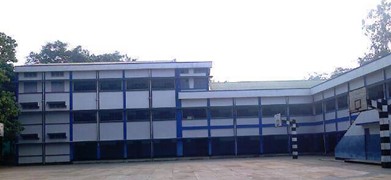
St Dominic Savio Parish, Garobadha, carved out of the Parish of Tura, was established in 1979. Fr Thomas Kochupurackal was its first Parish Priest. The Parish celebrated its silver jubilee in 2004. In number and vitality, the Parish of Garobadha has grown unbelievably.
Fr Joseph Puthenkulam, the then Vicar Apostolic of Tura, Fr George Stadler, the then Parish Priest of Tura, and Fr Victor Ampanattuvilla, the then Assistant Parish Priest of Tura, bought the land at Guramara hill (the village as it was known) in 1969. In the beginning of 1972, Fr George Stadler, the then Parish Priest of Tura, and Fr Anthony Valluran, the then Assistant Parish Priest of Tura, with the financial support of Most Rev. Hubert D’Rosario, then Archbishop of Shillong, bought some more land on the same hill in contiguity with the existing land.
Towards the end of 1972, some Catholics from Garobadha approached Bishop Orestes Marengo, the then Apostolic Administrator of Tura, requesting him to open an English medium school at Garobadha. Bishop gave his consent and requested Fr Anthony Valluran, who, being the touring priest of Garobadha area, to begin the construction of the school building and the teachers’ quarters with the intention of starting the school from February 1973. Bishop Marengo gave him Rs 10000 to begin the works. In the February 1973, St Dominic Savio School was opened with KG I and KG II with two teachers.
In April 1973, Bishop Marengo asked Fr Anthony Valluran to open a new parish at Selsella bifurcating it from Tura. Accordingly, in July 1973, Fr Antony moved to Selsella. Fr Thomas Kochupurackal, who was in Don Bosco School, Tura, was appointed Assistant Parish Priest of Tura and took charge of St Dominic Savio English Medium School, Garobadha. After some months, a hostel for boys and girls was built. The teachers of the school supervised the hostel. In 1977, M.E. school was started. In 1979, the parish was officially opened with Fr Thomas Kochupurackal as its first Parish Priest. Fr Thomas Manooramparambil came to help for a short time. In 1982, the Garo M.E. School and the night school were started.
The missionary zeal and the hard work of priests, sisters and lay catechists made the Parish grow; number of baptisms increased; several new Catholic communities were born in the villages. The Assistant priests who served in the Parish and constantly toured the villages need special recognition. They include Fr Arthur K. Marak (diocesan priest, 1982-83), Fr Anthony Vazhapilly (1983-85), Fr Denis Sangma Toju (1986-88), Fr Benedict Toppo (1990-92) and others in the later years. Fr Paul Panachickal was transferred to Garobadha from Mendal in 1984. During his term as Parish Priest (1984-90), the mission work saw great progress. Bishop Orestes Marengo who was with Fr Paul in Mendal came to Garobadha in May 1985. Bishop Marengo made Garobadha his home from 1985 to 1992. He served the Parish by visiting the various villages and generously helping the poor and the sick. Fr Victor Ampanattuvila succeeded Fr Paul as the Parish Priest and served for the years 1990-1998.
In 1992, St Dominic Savio School opened the high school section. There were three other English LP feeder schools in the sub-centres of the Parish. Fr Battista Busolin after 22 years of work at Rongjeng came to Garobadha on 24 January 1993. Thanks to Fr Busolin, the much needed extension and construction of the church building, the priests’ residence, the school and the hostels for boys and girls were undertaken. Fr Busolin left for Rongkhon on 7 April 1997. Fr Francis Kalariparampil served as Assistant priest for the years 1995-99. Fr Michael Bhengra was the Parish Priest from1999-2001. In 1999, Fr John Vadakkekuzhikattil joined the Parish as Assistant and served as Parish Priest for the years 2000-03. Fr Christopher Warlarpih (2000-01) and Fr Siby Vattaparayil (2000- 02) served as Assistant Parish priests. Br Attilio Areng and Br Athanasius Guria looked after the boys of the hostel for many years. At the departure of Fr John Vadakkekuzhikattil for medical treatment on 26 May 2003, Fr Victor Ampanattuvila was appointed Acting Parish Priest. Fr Emanuel Marngar helped for a short term (July-November 2003). Fr Francis Kalariparampil took charge as the Parish Priest on 21 October 2003 and Fr Victor Ampanattuvila was transferred to Sojong. Fr Albert Thyrniang joined as the Assistant priest in February 2004. Fr Alexius Dkhar joined the Parish community in 2007 as Assistant Parish Priest. On 21 April 2007, the Parish celebrated with great joy the priestly ordination of Fr Lyndoh T. Sangma, the first priest (diocesan) from Garobadha Mission.
The Salesian presence at Garobadha was established as a canonical community on 2016 and Fr Denis Sangma Toju was appointed first Rector. At present, the community consists of Fr Punit Kumar Lakra (Rector and Principal), Fr Siby John Vattappara (Parish Priest), and Fr. Soren Anmol (Asst. Parish Priest). Others who worked in the parish include Fr Paul Kuttikkadan, Fr Jogesh Sangma, Fr Albert Tigidi Sangma, Fr Thomas John Koitharaputhenpura, Fr Albert D. Sangma, Fr John Paul Tirkey and Fr John Mathias Marak.
Thanks to the hard work of a host of missionaries, priests, sisters and lay catechists, the Parish of Garobadha has seen an extraordinary growth since its beginning in 1979. It has given birth to new parishes of Ampati, Araimile and Chapahati. Some of its villages were attached to the new Parish of Babadam in 2014. Though several villages of Garobadha Mission have become part of the above new parishes, still the Parish of Garobadha has a vibrant Catholic population numbering 20,000 in 124 villages (2019 statistics). The number of baptisms including adult baptisms in the past years makes the community increase every year.
The Parish makes vital contribution in the education of the children and the young. St Dominic Savio Higher Secondary School educates a large number of Catholics. The Savio Hostel for the boys and Mazzarello Hostel for the girls make it possible for a big number of youngsters from the villages to pursue their high school and higher secondary studies at St Dominic Savio. The Parish caters to the educational needs of children in the rural area through a large network of village schools.
In 1982, the Daughters of Mary Help of Christians (FMA) reached Garobadha. Beginning with a simple structure, the Sisters have made remarkable contribution to the growth of the Mission. On 6 May 1984, the newly built Mazzarello Convent and the hostel for the girls were blessed by Bishop George Mamalassery. The Sisters are actively engaged in the school, parish work, village apostolate, health care and many other services.
The dedicated and collaborative work of the parish council, lay associations of men and women, altar boys, vocation club, teachers and catechists in the villages make the Catholic community of Garobadha grow from strength to strength
MENDAL
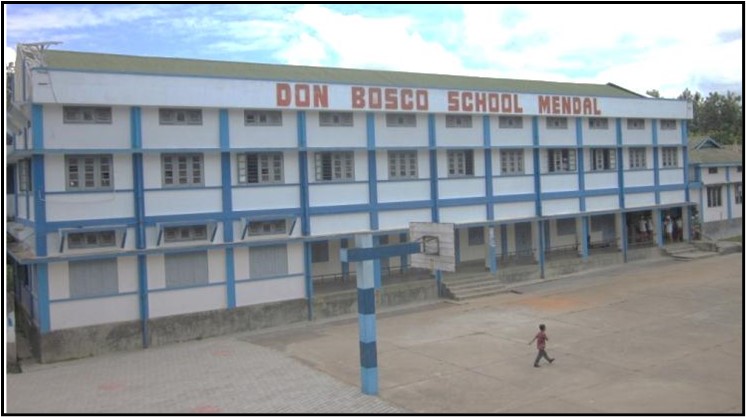 Don Bosco, Mendal is situated in the foothills of Garo Hills. The Government of India rehabilitated the Garos, who were displaced due to the civil unrest in East Pakistan, in the Garo Hills. This prompted Fr Julius Costa to volunteer to commence relief work among these displaced Garos. In the beginning he started his relief works from Tura. However, in 1968 Fr Costa selected Mendal as his headquarters and continued his social works reaching out to various villages where the displaced people were settled. During those years, Mendal area reaching up to Anogre on the Guwahati-Tura road was under the jurisdiction of Damra Parish. Later on, when Damra parish was divided and a new parish of Resubelpara was established, Mendal area came under its jurisdiction. Unfortunately, Fr Costa was murdered on 16 March 1970. Consequently, Mendal Relief Centre was closed down and the village church that Fr Costa had built was placed under interdict by Archbishop Hubert D’Rosario of Shillong.
Don Bosco, Mendal is situated in the foothills of Garo Hills. The Government of India rehabilitated the Garos, who were displaced due to the civil unrest in East Pakistan, in the Garo Hills. This prompted Fr Julius Costa to volunteer to commence relief work among these displaced Garos. In the beginning he started his relief works from Tura. However, in 1968 Fr Costa selected Mendal as his headquarters and continued his social works reaching out to various villages where the displaced people were settled. During those years, Mendal area reaching up to Anogre on the Guwahati-Tura road was under the jurisdiction of Damra Parish. Later on, when Damra parish was divided and a new parish of Resubelpara was established, Mendal area came under its jurisdiction. Unfortunately, Fr Costa was murdered on 16 March 1970. Consequently, Mendal Relief Centre was closed down and the village church that Fr Costa had built was placed under interdict by Archbishop Hubert D’Rosario of Shillong.
After seven years, in 1977, Fr Anthony Valluran, who was the Parish Priest of Selsella, volunteered to come to Mendal on condition that Mendal be declared a Parish. Both the Bishop and the Salesian Provincial agreed. On 22 August 1977, Mendal was declared a Parish and Fr Anthony Valluran took up his residence in the same building where Fr Costa stayed.
The entire Mendal and Gokolgre area had only a Government Primary and Middle School. The nearest high school was situated at Bejendoba, 10 kilometres from from Mendal. Since communication facilities were poor, most children would drop out of schooling after Class VII.
Meanwhile, the Managing Committee of the M.E. School at Gokolgre with the help of the teachers started class VIII but without much success. Realizing the sad plight of the students, some leaders of Mendal and Gokolgre approached Fr Anthony Valluran requesting him to open a High School in Mendal. The Managing Committee also agreed to shift Class VIII to Mendal if the Parish opened a High School.
Due to some problems, when the Salesian Provincial refused permission to open a High School at Mendal, Fr Anthony Valluran, realizing the sad plight of the students, approached Bishop Orestes Marengo, then Apostolic Administrator of Tura, with the same request. Bishop Marengo not only gave his permission but also agreed to pay the salary of one of the teachers. The people of Mendal selected a part of the village playground along the main road and constructed a bamboo shed large enough to accommodate the students up to Class X and a teachers’ room. Thus in February 1978, the High School at Mendal was inaugurated with Classes VIII and IX for both boys and girls, with Fr Anthony Valluran as its first headmaster. Later the Managing Committee consisting of the village elders took up the financial administration. The Government of Meghalaya offered ad-hoc grant to the School. In 1979-1980 a concrete structure was built with the financial support of Misereor. The Parish Priest became one of the Managing Committee members.
When Bishop Orestes Marengo retired and Bishop George Mamalassery became the Bishop of Tura, Bishop Marengo came to stay in Mendal. In 1982, Fr Anthony Valluran was called back to the newly created Salesian Province of Bangalore. Fr Paul Panachickal was appointed Parish Priest of Mendal.
Later, with much effort and influence from the district and state educational authorities, the Salesians in the parish took over the School. The School was renamed Don Bosco School, Mendal. At present, the School with classes from kindergarten to Class XII has nearly 900 students. There are three village schools under the parish with 422 students. Besides, the Parish runs a Vocational Training Centre with courses in welding, carpentry, house wiring, driving, etc.
The evangelization work in the Parish bore abundant results in the past years. The number of Catholics increased year by year; new communities were set up. As per 2008 statistics there are 1327 Catholic families in the Parish, with a total of 6732 parishioners. There are 87 villages with Catholic population.
Besides the founding fathers and pioneer missionaries mentioned above, the list of Salesians who worked in the Parish in various capacities include Bishop Orestes Marengo, Fr Anthony Vazhappilly, Fr Johnny Eapen Kalathoor, Fr Paul Panachickal, Fr Joseph Thudianplackal, Fr Mani Kochupura, Fr Jesu Ratnam, Fr Joseph Anikuzhikattil, Fr John Vadakkekuzhikattil, Fr Thomas Anikuzhikattil, Fr Zachary Varickasseril, Fr Hubert Marak, Fr Siby Vattaparayil, Fr Solomon Denis Joseph, Fr Albert Thyrniang, Fr Raphael Cherukareth, Fr Louis Bhengra, Fr Amit Lakra and Br Michael Kindo. The Salesian presence at Mendal was officially recognized as a canonically established community in 2006 under the patronage of St John Bosco.
At present (December 2024), the Salesian community consists of Fr Tomey Anikuzhikattil (Rector and Parish Priest), Fr Punit Lakra (VR and Principal), Fr Daniel S. SAngma (Vice-Principal) and Fr Benny Mushahary (Director NFT).
In 1978, the Sisters of Society of Christ Jesus (SCJ) established the Bethany Convent and began a variety of services in the Parish. They conduct the boarding for girls and are actively involved in social and developmental programmes in the villages. The Parish Council and other lay associations like that of Women, Youth and Past Pupils do play an active role in the well-running of the Parish
RONGJENG
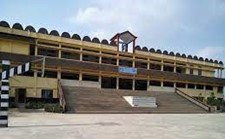 Holy Family Parish, Rongjeng, in the East Garo Hills District of Meghalaya, is one of the largest parishes in the diocese of Tura. The Parish, dedicated to the Holy Family, was officially erected on 8 September 1971, separated from the Parish of Damra. The Salesian community was canonically constituted in 1982.
Holy Family Parish, Rongjeng, in the East Garo Hills District of Meghalaya, is one of the largest parishes in the diocese of Tura. The Parish, dedicated to the Holy Family, was officially erected on 8 September 1971, separated from the Parish of Damra. The Salesian community was canonically constituted in 1982.
The Catholic Church began its presence in Rongjeng in 1947. Fr Ernest Zanon, who was stationed at Tura, visited the area in 1947 and baptized the first Garo family at Rongjeng. When the new Mission of Damra was established in 1946, the whole of East Garo Hills came under its jurisdiction. The pioneers at Damra like Fr Hubert Colzani and Fr George Stadler began to visit the villages of Rongjeng.
In 1951, Fr Battista Busolin reached Damra and was designated to evangelize the Garos in the hills. Between the years 1951-54 Fr Busolin baptized about 40 families in the Rongjeng area. In 1954, Fr Busolin was transferred to Baghmara. Fr Dominic Curto, who was at Damra (1956-69), extensively toured the Garo villages and by 1969 there were about 100 Catholic families in Rongjeng area. In 1965, after prolonged efforts, Fr Curto succeeded in getting the two hillocks in Rongjeng for the Catholic Mission. Mr Tomin Nokma and Mr Toboth Momin, two prominent leaders of the area helped greatly to get the place. In the same year Fr Curto constructed a small chapel at Rongjeng, which also served as his residence whenever he visited the place. In 1966, the annual Sobha of Damra Parish was held at Rongjeng. Bishop Stephen Ferrando was present for the function and he blessed the sites for the construction of the Church and the Convent. In 1967, the chapel was extended and Fr Curto started the Garo medium L.P. school using the same chapel building. Mr Jangjim Sangma was the first headmaster and Mr Mansing the first catechist of Rongjeng. In 1969, Fr Curto had to leave Damra under a quit order served on the foreign missionaries by the government. In the following year, Fr Martin Caligaris, stationed at Damra, tried to complete the extension work of the church building at Rongjeng.
In 1970, the Catholics of Rongjeng delegated their catechist, Mr Jamini, to meet the Archbishop of Shillong to plead for a priest to care for them. In January 1970, Archbishop Hubert Rosario had come to Dalu for the annual Sobha. Mr Jamini met the Archbishop at Dalu and made the request. As a result, the Archbishop instructed Fr Battista Busolin, who was Assistant priest at Tura Mission, to look after the Catholics of Rongjeng area. In the years 1970-71, Fr Busolin with great sacrifice toured the villages and brought many to the Catholic Church. Meanwhile, Fr Busolin and Fr Mathew Kizhakkemury MCBS were instructed to open a Mission Centre at William Nagar. Due to several reasons it did not happen at that time. Instead, they found Rongjeng more suited for a new Parish. Fr Busolin and Fr Mathew came to Rongjeng in the first week of September 1971. On 8 September 1971, the Parish of Rongjeng was formally inaugurated. The name of the Church was changed from St Mary’s to Holy Family Church.
After the formal beginning of the Parish, Fr Busolin spared no effort in providing the urgently needed infrastructure for education. The school building needed extension; the hostels for boys and girls were built up; the Parish Church was renovated and extended; the Holy Family School was upgraded to High School in 1981; a number of LP schools were constructed in the villages.
Soon Fr Henry Frassy joined the team at Rongjeng. The evangelization work got intensified by touring the villages; baptisms increased and new Catholic communities were added. The Parish witnessed an extraordinary growth in number and fervour. Fr Mathew Kizhakkemury was transferred to Chokpot in 1975. In 1976, Fr Victor Gorla (a diocesan priest) joined Rongjeng and in the following year Fr George Stadler came. They realized the need for dividing the vast Rongjeng Parish. Fr Henry Frassy and Fr Victor Gorla toured mostly the North-Western part of the Parish. They opened the Parish of William Nagar in 1977. Fr George Stadler concentrated on Mangsang area and it was inaugurated as a Parish in 1978. Fr George Parambukattil MSFS, who reached Rongjeng in 1975, began to give much attention to Nongal region and Nongalbibra became a full-fledged Parish in 1989. It was an epoch-making decade of growth for Rongjeng as seen from the birth of number of new Parishes.
By 1989, though the area of Rongjeng Parish got reduced considerably, there was plenty of work still. In the successive years, the missionary zeal and dedication of Fr Mani Kochupura, Fr Thomas Anikuzhikattil, Fr Mathew Kadavunkal, Fr Francis Kottekarotte, Fr Thomas Kochupurackal, Fr Denis Toju, Fr George Kariparambil, Fr Anthony Marak, Fr Victor Ampanattuvila, Fr Patrick Nongrang, Fr Marcus Lakra, Fr Joseph Teron, Fr Emmanuel Marngar, Br Somolon Marak, Fr Charles Sangma, Fr Gabriel G. Momin, Fr Amit Kumar Lakra, Fr Alphonsius Rongrin, Br Nirmal Ekka, Fr Louis Bhengra, Fr Aloysius Hemrom, Br Sunil Prakash Kerketta, Fr Joachim Pumah and others who served the Parish have brought many more people to the Catholic Church.
In 1988, Fr Thomas Anikuzhikattil (Tomey) took over the administration of the Holy Family High School from Fr George Kariparambil. Few months earlier, the administration of the School was transferred from the hands of the Sisters to the Salesians. Fr George Kariparambil was the first Salesian Headmaster of the school. Thanks to the hard work of Fr Thomas Anikuzhikattil, the Holy Family School came under government deficit system of payment. In 1990, Fr Denis Toju became the Headmaster of the Holy Family School.
In 1992, Fr Busolin was transferred to Garobadha and Fr Denis Toju took over as the Parish Priest. The growth of Rongjeng Parish owed much to twenty-two years of hard work of Fr Busolin. The Salesian presence at Rongjeng was canonically recognized in 1982. There are 16,846 Catholics, 3414 families spread out in 93 villages of the Parish as per 2019 statistics. The Parish runs five schools in the villages. Besides the hostel for boys and girls at the centre, there are hostels in sub-centres like Rongmil, Naringgre, Nongchram and Dambo-Rongdeng. Evangelization, catechesis and education are still the top priorities of the Parish. The vibrant youth movement is also actively engaged in the various activities of the Parish.
When Fr Charles Sangma was the parish priest, the Holy Family high school was upgraded into a higher secondary school. For this purpose, an additional floor was added to the existing school building. A computer lab was set up. The Salesian residence was renovated.
The Missionary Sisters of Mary Help of Christians (MSMHC) opened the Holy Family Convent in the same year of inauguration of the Parish. In 1971, due to Indo-Bangladesh war, MSMHC group that was at Baghmara was forced to shift and thus moved to Rongjeng. On 25 October 1971, the Convent was inaugurated. Since then the services of Sisters at Rongjeng helped greatly the development of the Parish as well as the School. Till 1988 the Sisters looked after the Holy Family School. Today, they look after the hostel for the girls, render medical care through dispensary, engage in evangelization tours and catechizing, conduct vocational training programmes and do many other services in the Parish.
At present, the Salesian Community consists of Fr Pojit Marak (Rector and Principal) Fr Hubert Marak (Parish Priest), Fr Sachin Kujur (Asst Parish Priest)
Don Bosco Centre for Learning – 2016 [C-2022]
 Don Bosco Centre for Learning, Tura was until recent part of Don Bosco College Tura, which was established by the Salesians of Don Bosco in 1987 to serve the cause of higher education of the people of the Garo Hills in particular and of north-east in general. The Don Bosco Centre for Learning previously Don Bosco Junior College was officially inaugurated by Shri Purno Sangma, the then Union Minister for Labour, on 22 May 1987 and this date is observed as the Centre’s Foundation Day. Fr Cyriac Vettickathadam the founder principal of the college served the college for about 25 years. Over the years, the college has grown to become one of the premier institutes in the State of Meghalaya.
Don Bosco Centre for Learning, Tura was until recent part of Don Bosco College Tura, which was established by the Salesians of Don Bosco in 1987 to serve the cause of higher education of the people of the Garo Hills in particular and of north-east in general. The Don Bosco Centre for Learning previously Don Bosco Junior College was officially inaugurated by Shri Purno Sangma, the then Union Minister for Labour, on 22 May 1987 and this date is observed as the Centre’s Foundation Day. Fr Cyriac Vettickathadam the founder principal of the college served the college for about 25 years. Over the years, the college has grown to become one of the premier institutes in the State of Meghalaya.
Taking into consideration the recommendation of the NAAC peer team that the Higher Secondary Section should be de-linked from the Degree College and to give greater focus to the students at the Plus Two level, Fr John Parankimalil (PD), the then Principal of Don Bosco College, requested the then Salesian Provincial, Fr Thomas Vattathara, for permission to de- link the Higher Secondary Section. The Provincial deputed Fr Januarius S Sangma, the then in-charge of the Garo Hills, to study the request of the Principal of the College. Fr Januarius held several rounds of meetings and consultations with the Salesians working in the Garo Hills region and particularly with those of Don Bosco College Community. Basing on the suggestions from the region, the Provincial and his council took the decision to shift the Higher Secondary Section to the existing hostel campus. Fr John Parankimalil (PD) was given the tasks of re-structuring the hostel building for the higher secondary classes and of constructing a new hostel building for the students.
The Higher Secondary Section of Don Bosco College Tura was shifted to the present campus on 22 June 2014 and was named as Don Bosco College: Higher Secondary Section. It was inaugurated on 24 July 2014 by Shri E. P. Kharbhih IAS, the then Commissioner and Secretary, Education, Government of Meghalaya and Executive Chairman of Meghalaya Board of School Education, Tura. Several dignitaries were present on the occasion including Most Rev. Andrew R Marak, Bishop of Tura, and Shri Pravin Bakshi IAS, the then Deputy Commissioner of West Garo Hills District.
Towards the end of December 2016, Junior College was made an independent community with Fr Thomas Chenginiyaden as its first Director. When Fr Jimmy was transferred to Holy Cross Church, Rongkhon in February of 2017, Fr Thomas Chenginiyaden took care of the college. Fr Zacharias Varickasseril was appointed as the Director when Fr Thomas Chenginiyaden was transferred to Satgaon in February 2018. Fr Jogesh B. Sangma was appointed the Principal of Higher Secondary Section in June 2018. With the transfer of Fr Zachary Varickasseril to Degree College Community, Fr Francis Cheeramben was appointed the Director in April 2019.
Don Bosco Centre for Learning, Tura consists of Don Bosco College Higher Secondary Section and Don Bosco College Boys’ Hostel. The Centre also looks after the Salesians in formation who undertake their studies in the college. Salesians those who worked as wardens are Fr Thomas Kunnappillil, Fr Joy Kachappilly, Fr Roland Halge, Fr Zacharias Varickesseril, Fr Alex Kattakayam, Br Joby Mani, Fr Jogesh B. Sangma and Fr Albert D. Sangma. At present (June 2025) the community consists of Fr Jogesh B. Sangma (Rector), Fr. Andreas Panna (Vice Rector), Fr. Bromio Ch Marak (Vice Principal), Deacon Francis Xavier Minj and the student clerics.
Don Bosco College –Tura – 1993 [C-2005]
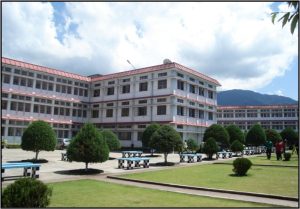 Don Bosco College, Tura, is the Salesian response to the higher educational need of the young people of Garo Hills in particular and north-east India in general. With the mandate from the Salesian Provincial and his Council of Guwahati, Rev. Fr Antony Buccieri purchased a plot of land meant for the College. Preparatory works for the establishment of a College was entrusted to Rev. Fr George Karipaparampil. In 1986, Fr George came to stay in the community of Don Bosco School, Tura for the purpose.
Don Bosco College, Tura, is the Salesian response to the higher educational need of the young people of Garo Hills in particular and north-east India in general. With the mandate from the Salesian Provincial and his Council of Guwahati, Rev. Fr Antony Buccieri purchased a plot of land meant for the College. Preparatory works for the establishment of a College was entrusted to Rev. Fr George Karipaparampil. In 1986, Fr George came to stay in the community of Don Bosco School, Tura for the purpose.
As a result of the meticulous work of Fr George, the North Eastern Hill University (NEHU) granted permission to begin Don Bosco College, Tura on 5 November 1986. Rev. Fr John Kalapura, the then Provincial, constituted the first Governing Board of the College on 3 January 1987. Rev. Fr Cyriac Vettickathadam was appointed the first Principal of the College. The classes began on 21 April 1987. The official inauguration of the College took place on 22 May 1987. Most Rev. George Mamalassery, the then Bishop of Tura blessed the College and Mr Purno A. Sangma, the then Union Minister for Labour, officially inaugurated it.
Initially the College offered Pre-University and Degree courses in Arts. The classes were held in the Boys’ Hostel building of the Sacred Heart Parish, Tura. Some boys were also taken into the hostel in 1987. In the following year, after prolonged discussions and discernment, the College was opened to girls. The Salesian Sisters agreed to look after the hostel for the girls.
In 1993, the classes were shifted to the hostel buildings constructed at Sampalgre. In the successive years, the College began other courses science at Pre-University and degree levels. Honours courses both in B.A. and B.Sc. were also added. Later, degree courses in commerce, Business Administration (BBA) and Computer Applications (BCA) were introduced.
In 2001, the College was shifted from the hostel to its permanent campus. The infrastructure of the College consists of the Academic complex, hostels and staff quarters. The College has an impressive amphitheatre-a multipurpose facility comprising a basketball court and canteens. The Salesian presence at the College was formally recognized as a Salesian community in 2002 with Fr Cyriac Vettickathadam as its first Rector. During the tenure of Fr Cyriac, a large plot of land was purchased where rubber was planted. Besides offering the students research facilities, the rubber garden supports the College financially. When Fr Cyriac was transferred in 2011, Fr Alex Kattakayam was appointed Principal of the College.
In 2005, a College for teacher education, named, Don Bosco College of Teacher Education was established in the same campus. Initially, Sr Rose Ann Antony, a retired Principal of a B.Ed. College from Thirvanthapuram, Kerala, belonging to the Congregation of the Missionary Sisters of the Immaculate Heart of Mary, was officially appointed Principal while Fr Zachary Varickasseril directed the day-today running of the College. A hostel to accommodate B.Ed. students (boys) was constructed adjacent to the boys’ hostel in 2009. Similarly, a girls’ hostel to accommodate B.Ed., degree and higher secondary students was also constructed. Named as Margaret Bosco Girls’ Hostel, it was entrusted to the Daughters of Mary Help of Christians (FMA) to run. In 2010, Fr John Parankamalil was appointed Principal of Don Bosco College of Teacher Education. In 2017, Fr Zachary Varickasseril returned to the College as its Principal. Initially, the College admitted 100 students for one-year course but when the University introduced two-year B.Ed. course, the College had a strength of 200 students. Over the years, the College has brought in excellent results at the University examinations and in 2011 the College bagged all the ten ranks.
In 2014, the Higher Secondary wing of the College was shifted to the hostel campus and was established as Don Bosco College Higher Secondary section. Rev. Fr Jogesh Sangma was appointed to look after it. In the initial period, when it functioned as hostels and later as Don Bosco College Higher Secondary Section, the community was attached to the College Community. However, in 2017 it was made an independent community with Rev. Fr Thomas Chenginiyadan as its first Director.
The College functions through a collaborative venture in which various College Committees and Students’ Welfare Association participate. The Counselling Centre at the College renders personal counselling as well as imparts career counselling and value education. The College has the units of NCC and NSS. It promotes academic excellence by offering scholarships/free-ships to meritorious students. The College has an I.A.S. Study Circle where coaching is given for Central and State civil service examinations and for entrance examinations in Management, Engineering, Medicine, etc. The Study Circle is supported by the State government and is open also to the public. The Campus Ministry at the College cares for the spiritual welfare of the students by organizing Mass for the Catholic students on first Fridays, holding conferences and conducting Bible classes for hostel students, etc. The College choir makes the religious services more attractive and prayerful. The College, thus, lays great emphasis on an education that is participatory in nature, intellectually competent, multi-skill oriented, value based and socially committed. True to the Motto ‘Pursuit of Excellence’, the College is passionate about excellence in every sphere, academic, professional, social and personal.
The year 2011-12 was the Silver Jubilee year of the College. The presence of Dr Mukul Sangma, the then Chief Minister of Meghalaya, at the Silver Jubilee celebrations was an important milestone in the annals of the College. In the same period, the College went for NAAC accreditation and was awarded B+ Grade with CGPA score of 2.45 on four-point scale. In 2013, Fr John Parankimalil (PD) took over as the third Principal of the College and in the year 2016 Fr George Plathottam was appointed the fourth Principal. Having attained retirement age, he laid down office in July 2017. Fr Bivan Rodriques Mukhim took up the mantle as the fifth Principal of the College and serves till 2024. Presently Fr Januarius S. Sangma is the Principal.
In the year 2017, two new departments were introduced BA Sociology and BA Geography. The College is contemplating on introducing BSW and BSc Computer Science. The College got the NAAC re- accreditation in the year 2023 (second cycle).
The confreres who have worked in Don Bosco College, Tura include Fr Battista Busolin, Fr Cyriac Vettickathadam, Fr Thomas Manooramparampil, Fr Thomas Kunnappallil, Fr Joy Kachappilly, Fr Roland Halge, Fr Joby Manjakattil, Fr Henry Warbah, Fr John Parankamalil, Fr Alex Mathew Kattakayam, Fr Francis Fernandez Maliekal, Fr Pius Tharakunnel, Fr Januarius S Sangma, Fr Joseph Pazhaekadavan, Br Joby Mani, Fr Pradeep Ekka, Fr Robert Faustin Lalfakzuala, Fr Albert K. Sangma, Fr Jogesh Sangma, Fr Maria Arul Anthuvan, Fr George Plathottam, Fr Bivan Rodriques Mukhim, Fr Zachary Varickasseril and Fr Jimmy T. Sangma. Presently, the Salesian community consists of Rev. Pius Varghese (Rector and Principal, DBCTE), Fr Januarius S. Sangma (Principal, Degree College), Rev Fr John Paul Tirkey (Vice Principal) and Fr Louis Arimboor (Administrator). In the last 39 years, Don Bosco College has distinguished itself as one of the premier Colleges in Garo Hills. It is the endeavour of everyone at Don Bosco College to keep the flag aloft and continue its tradition of pursuit of excellence and quality of service.
Don Bosco School-Tura (1956) [C-1969]
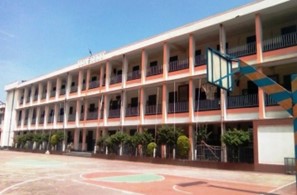
Don Bosco School, situated in the heart of the town of Tura, the District Headquarters of the West Garo Hills district of Meghalaya, has evolved into a premier educational institution of the region. The school had a humble beginning in 1956. Fr Anthony Buccieri, who was an outstanding missionary of the Garo Hills, initiated the school. The Salesian presence was officially recognized as a canonical community in 1969. The dedicated hard work of successive headmasters like Fr James Burns, Fr Thomas Thekkekandam, Fr Thomas Chenginiyaden, Fr Joseph Edakudan, Fr Joseph Parippil, Fr George Plathottam, Fr Charles Sangma , Fr Januarius S Sangma and Fr Albert Thyrniang has made Don Bosco Tura, a much sought after school. Others who served the institution in the past years include Fr Victor Ampanattuvilla, Fr Joseph Puthenkalam, Fr Joseph Puthenpurackal, Fr Jacob Thotekat, Fr Sebastian Kunnathukuzhy, Fr George Maliekal, Fr Sebastian Palatty, Fr Thomas Manooramparambil, Fr Anthony Vazhappillil, Fr Anthony Marak, Fr Jose Mariadas Kallanickal, Fr Punit Kumar Lakra, Fr Ranjeet Xalxo, Fr Ignatius Sangma, Fr Charles Deepen Lakra and Br. Nirmal Ekka.
At present Fr Threnius N Sangma is the Rector and Principal, Fr Ravi Prabhat Ekka is the Vice Rector and Vice Principal and Br Lating Bajanai Kupar is the Vice Principal.
Don Bosco Boys’ Home, the boarding house was started in 1980 in order to offer educational opportunity for boys of distant villages and other parishes of the region.
In order to extend educational opportunity to the most deprived of the area, the school began the Don Bosco Evening School in 1988. It was the centenary year of the death of Don Bosco. Fr Thomas Chenginiyaden, who was the then Rector and Headmaster, took the initiative for the Night School. Fr Thomas carried out the extension works of the school building. Fr Charles Sangma undertook the initiative of constructing a stadium and many other extension projects in the school campus. The School, other than in academic field, excels also in sports and games. The School has well reputed scouts/guides/NCC troops. Fr Januarius S Sangma constructed an additional block for the school in order to upgrade it into a higher secondary. Don Bosco Book Centre is another service rendered by the community. It provides educational, religious and moral literature, audio-video cassettes and religious articles.
Don Bosco Youth Centre attached to the community renders different services for the youth of the locality. In the past years, the Youth Centre undertook several initiatives under the leadership of directors like Fr Thomas Manooramparambil, Fr Anthony Vazhappillil and Fr Anthony Marak, Fr Ignatius Sangma and Fr. Benjamin Daimary. The Centre offers computer education and coaching classes; conducts various outdoor tournaments; and provides library facilities for the graduate and post-graduate students.
RONGKHON
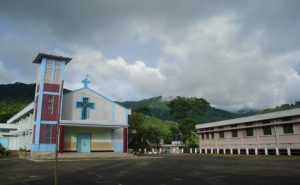
Holy Cross Parish, Rongkhon, was once part of the Tura Parish. In 1986 when Bosco Mount Aspirantate was started, the Parish of Rongkhon was inaugurated. It was the wish of Bishop George Mamalassery, Tura, that the new Parish be named Holy Cross Church. Fr Henry Frassy was the first Parish Priest. The Salesian presence at the Parish was attached to the canonically erected community of Bosco Mount. It was also with the hope that the Salesians in the institution could also exercise their pastoral ministry among the people of the nearby villages that the Parish was started. At the time of its establishment in 1986 the Parish had 2894 Catholics spread over some 40 villages. Fr Henry Frassy worked zealously and the number of Catholics increased steadily. Fr Frassy had initiated the construction of much of the infrastructure at the Parish. Before the construction works were completed, Fr Frassy was called to his eternal reward on 22 January 1997. After the death of Fr Frassy, Fr Anthony Buccieri helped in the Parish before Fr Battista Busolin was moved in from Garobadha to carry forward the work at Rongkhon. The High School at the Parish and a number of village schools cater to the educational needs of the people. The hostels at the Centre and at the sub-centre Chidekgre help many boys and girls of far away villages to attend schools. The Catholic community has achieved remarkable growth in the past years. When Fr Busolin was transferred to Don Bosco College, Tura, Fr Denis Toju Sangma was appointed the Parish Priest. After him, Fr Augustine Edasseritthottathil and Fr Hubert Marak served as Parish Priests and now Fr Amit Lakra is the Parish Priest. Other confreres who worked in the Parish as Assistant Parish Priests include Fr Anthony Marak, Fr Alex Kattakayam, Fr Michael Bhengra and Fr Francis Kalariparampil.
The Missionary Sisters of Mary Help of Christians (MSMHC) began to work in the Parish in 1988. Don Bosco Convent was officially inaugurated on 30 January 1989. The sisters render valuable services in the parish school, hostels and do a variety of parish ministries. The staff and aspirants of Bosco Mount help in the Parish ministry in many ways. During the time of Fr Augustine Edasseritthottathil, a new junior school building was constructed adjacent to the parish church. In the meantime, the Salesians took over the administration of the Parish school, which were in the hands of MSMHC sisters since its inception, although the Parish Priests acted as the Principal. However, when Fr Francis Kalariparampil was designated to the community, he was appointed the Principal of the School. During this time, the school was upgraded into higher secondary and completed a new block to the existing school building. After Fr Francis, Fr Pius Tharakunnel was appointed the Principal of Don Bosco Higher Secondary School, Rongkhon. Fr Pius extended the Junior school by constructing an auditorium. He has also prepared a playground for the school in front of the Junior School.
In 2014, the Parish was bifurcated and a new Parish of Babadam was established. In 2016, the parish and school setup was made an independent community. In December 2024, the Salesian community consists of Fr Bartholomew Marak (Parish Priest), Fr George William (Assistant Parish Priest) and Fr Martin Marak (Principal).
